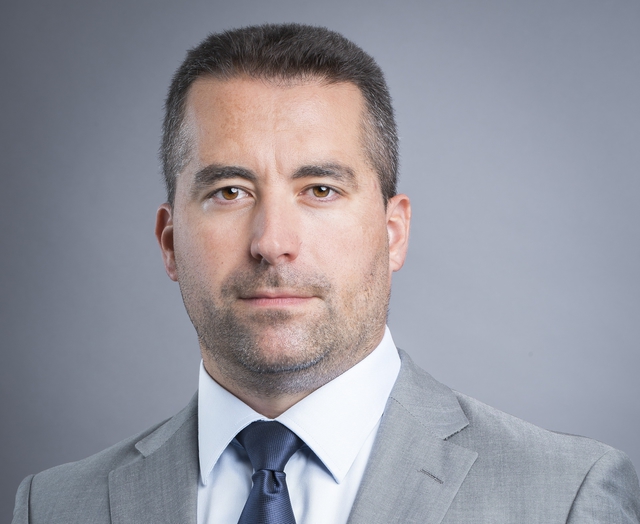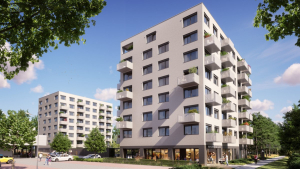
One of the most important local players on the Hungarian market has closed two transactions at the end of 2017 and there are more in the pipeline for 2018. Balázs Czifra, Property Investment Director at Diófa Asset Management talked to Property Forum about his plans and expectations.
In 2017 Diófa has been less active on the investment market than other Hungarian fund managers. What is the reason behind the smaller number of acquisitions?
Our company went through a short period where the focus shifted to our existing property portfolio. This period, however, is over, we are moving ahead at full speed and closed two transactions at the end of last year. We have acquired the Infopark A office building in Budapest and a logistics park in Sopron, Western Hungary. We will continue to expand our portfolio in 2018 and plan to announce some truly newsworthy deals, including transactions that involve single asset worth over €50 million.
In your opinion, where will be the end of the current yield compression? Is there a level where you would stop buying?
We assess each asset individually, there can be certain features that justify a higher price. I think there’s a market threshold and yield levels won’t go lower than that. As an investor, we don’t want to get too close to this threshold and we want to continue to operate with higher yield levels. That being said, I cannot just draw a line at 6.5 percent for offices and say that we are not willing to go lower because there is pressure on us to buy new assets.

We expect no change in the short run, but we should not forget that the cycle can turn any moment due to market interdependence and an external shock can rapidly reach Hungary. Currently I see a bit too much optimism on the market, hence we are building a diversified portfolio, not just in terms of asset class and location. Our portfolio includes assets that – in a classical sense - are not perfect but based on their performance no one can say that it was a bad call to buy them.
Some would say that Shopmark is such an asset. As I understand you are preparing a major refurbishment there.
When purchasing Shopmark, we agreed to refurbish the asset but instead of a simple renovation that would only benefit a few tenants we wanted to turn this obligation into a project that would create real added value. The shopping centre will be completely overhauled, repositioned and introduced as a brand new product. The building – including the interior design, the façade, the engineering, etc. – will be transformed and the tenant mix will also change. A 26,000 sqm shopping centre will be closed down and completely redesigned – that is unprecedented in Hungary.
How long will Shopmark stay closed?
We will temporarily close the centre at the end of April, to do the reconstruction over the less busy summer months and reopen at the end of August. We will also set up a temporary shopping area on site for some of our tenants that want to operate without interruption.
What makes you so confident in this project?
We believe in this project because we believe in the strength of the retail market and because our tenants believe in us. In spite of the temporary closure, practically all of our 65+ tenants will stay with us but there is a strong interest from new tenants as well, including major fashion brands that have not been present in Shopmark. This is going to show that smaller, local, “second-tier” shopping centres can move upward on the scale. Of course I must note that the renovation will create an added value that makes it profitable for the fund.

Classic speculative developments are still not on the table, but we are looking into the possibility to expand our existing properties. We will certainly move forward with one project that includes the development of a city logistics hall. I don’t see us entering the market as a developer because there is a huge risk on the construction side, but if a tenant with the right financing and risk-taking ability is looking for a long-term partner, we’re open to projects that can create value.
Is it possible that you will acquire assets abroad?
It is not impossible. There are certain opportunities, but this is not our focus. There are countries in the region with a stable and more mature market, where, -with the right partner- there is a possibility to enter. Also, there are individual opportunities that fall outside the radar of larger international players but can seem attractive for a Hungarian fund or private investors. For example, mid-sized companies in German-speaking countries have a significant property portfolio and local buyers are often not interested in purchasing them due to their size.
Do you expect other local players to expand outside of Hungary?
I do not think that this is a trend, but there are certain examples in different submarkets. A small market like Hungary’s can be outgrown by certain players.
Do you expect regional players to become more active in Hungary?
Hungary is a relatively attractive investment destination, we still offer higher yields than other markets in the region. We have seen examples on on the Czech retail market where prime yields have reportedly reached 3.5 percent, so it is completely natural for funds to start looking beyond their borders.



